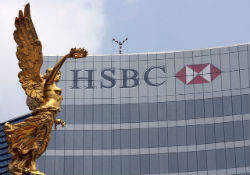The family members of US citizens killed in Mexico from drug violence have sued HSBC for permitting cartels to launder huge amounts of illicit money through the bank, a case that could have major implications for how accomplices of the drug trade are prosecuted.
The lawsuit claims HSBC is liable for the violence that stems from international drug trafficking because the London-based bank knowingly allowed drug cartels to launder hundreds of millions of dollars through HSBC subsidiaries, reported Reuters. In December 2012, HSBC agreed to pay $1.9 billion in fines to US authorities following charges that Mexico’s Sinaloa Cartel and Colombia’s Norte del Valle Cartel laundered $881 million through the bank.
The lawsuit refers to the murders of US citizens by Mexican drug cartels between 2010 and 2011, according to Bloomberg. The victims’ family members are now attempting to hold HSBC accountable for their deaths under the US Anti-Terrorism Act.
“The Mexican drug cartels are terrorists who routinely commit horrific acts of violence to intimidate, coerce, and control the civilian population and the government,” a lawyer for the families wrote in an e-mail to Bloomberg. “HSBC was complicit in laundering billions of dollars for drug cartels and should be held accountable under the Anti-Terrorism Act for supporting their terrorism.”
The bank has reportedly said it will contend the lawsuit.
InSight Crime Analysis
If HSBC is ordered to pay damages to the families victimized by cartel violence it could potentially open a new set of possibilities regarding who is liable to prosecution for their role in the international drug trade.
In the most obvious example, other banks besides HSBC would become very nervous. In 2010, Wachovia (which is now part of Wells Fargo) agreed to pay $160 million after US prosecutors found over $100 million in drug proceeds had been laundered through the bank. And these cases may just be the tip of the iceberg; in 2012 a US Department of Justice official said international drug traffickers launder $85 billion each year in the United States.
SEE ALSO: Coverage of Money Laundering
But as El Daily Post points out, a wide range of actors besides banks could also be considered liable for Mexico’s drug violence, from real estate agents to car dealers to even drug consumers. Ruling against HSBC may expose a plethora of other US institutions to lawsuits as well.
A successful lawsuit could also embolden Mexican victims of the drug war to file similar complaints, who outnumber their US counterparts by an overwhelming majority. A staggering 60,000 people are believed to have died as a result of drug violence in Mexico between 2006 and 2012.
Whether the complaint has legal merit, however, is uncertain. The plaintiffs are suing HSBC under the US Anti-Terrorism Act, but no Mexican drug cartel has ever been listed as a foreign terrorist organization by US authorities. This case could therefore revive debate about whether cartels should be considered terrorist groups.

